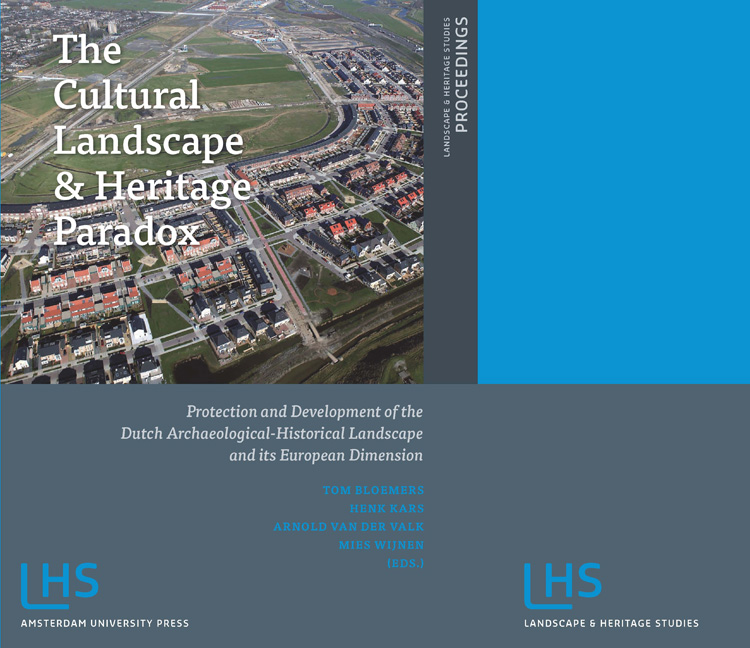 The Cultural Landscape and Heritage Paradox
The Cultural Landscape and Heritage Paradox Book contents
- Frontmatter
- Contents
- Preface
- I INTRODUCTION
- II INSIGHTS AND PROSPECTS OF ARCHAEOLOGICAL-HISTORICAL LANDSCAPE STUDIES
- III LINKING KNOWLEDGE AND ACTION
- IV IMAGINATION - FACTS AND CONSTRUCTIONS
- V SHARING KNOWLEDGE - STORIES, MAPS AND DESIGN
- VI SYNTHESIS AND CONCLUSIONS
- VII MANAGEMENT OF KNOWLEDGE
- VIII AGENDA FOR THE FUTURE
- IX SUMMARY
- X APPENDIX
- Subject Index
- Index of Places and Regions
2 - From Oer-IJ Estuary to Metropolitan Coastal Landscape. Assessing and Preserving Archaeological-Historical Resources from 4000 years of Living between land and water
Published online by Cambridge University Press: 21 January 2021
- Frontmatter
- Contents
- Preface
- I INTRODUCTION
- II INSIGHTS AND PROSPECTS OF ARCHAEOLOGICAL-HISTORICAL LANDSCAPE STUDIES
- III LINKING KNOWLEDGE AND ACTION
- IV IMAGINATION - FACTS AND CONSTRUCTIONS
- V SHARING KNOWLEDGE - STORIES, MAPS AND DESIGN
- VI SYNTHESIS AND CONCLUSIONS
- VII MANAGEMENT OF KNOWLEDGE
- VIII AGENDA FOR THE FUTURE
- IX SUMMARY
- X APPENDIX
- Subject Index
- Index of Places and Regions
Summary
ABSTRACT
The subject of this paper is the study of the wetland Oer-IJ area northwest of Amsterdam. The application of ‘action research’ and the cultural biography are outlined and followed by two specific aspects of water, the religious meaning and the relevance for degradation.
The analysis of the context of the action illustrates that the ‘conventional’ activities fit into Hoppe's ‘engineers’ model with policy ‘on top’ and researchers ‘on tap’ creating tensions between policy and research. The ‘unconventional’ activities complied more with the policy-oriented learning models based on equal partnership.
The cultural biography of the Oer-IJ has been named ‘the forgotten delta’ and presents a case to explore this concept in the context of planning. Before implementing the narrative definition, methods and context of use are explained. By its geological transformation, present-day landscape structure and the long-term development of landscape patterns, the buried delta itself offers the strongest regional identity possible. People's relationship with water while living on the ‘wet’ land has been dominant and determined by the principles behind the long-term development of the estuary.
A specific research topic was to make predictive maps of ritual activities in the pre- and protohistoric period. It was assumed that in the Oer-IJ ritual activities took place within the wet low-lying parts of the landscape. All 499 known archaeological sites from the pre- and protohistoric period were re-evaluated. A total of 22 sites in wet low-lying parts of the landscape were interpreted as offering sites. From these findings a model was made in which the time, place and find complex of offering sites were combined for the predictive modelling of the offering sites.
Another specific project focused on the degradation of archaeological sites in the Oer-IJ wetland. On selected sites the position and condition of the cultural layer was noted and sampled. The groundwater level was studied by divers, dataloggers and in dipwells. Furthermore, the redox potential was fixed as a measure of the presence of oxidizing substances. In addition the soil pH was sampled at several depths at each monitoring location. An important conclusion is that a rise in the groundwater level is not always favourable for the archaeological remains. Depending on the local hydrology, this can lead to the reversal of a seepage situation to an infiltration environment.
- Type
- Chapter
- Information
- The Cultural Landscape and Heritage ParadoxProtection and Development of the Dutch Archaeological-Historical Landscape and its European Dimension, pp. 203 - 238Publisher: Amsterdam University PressPrint publication year: 2010


